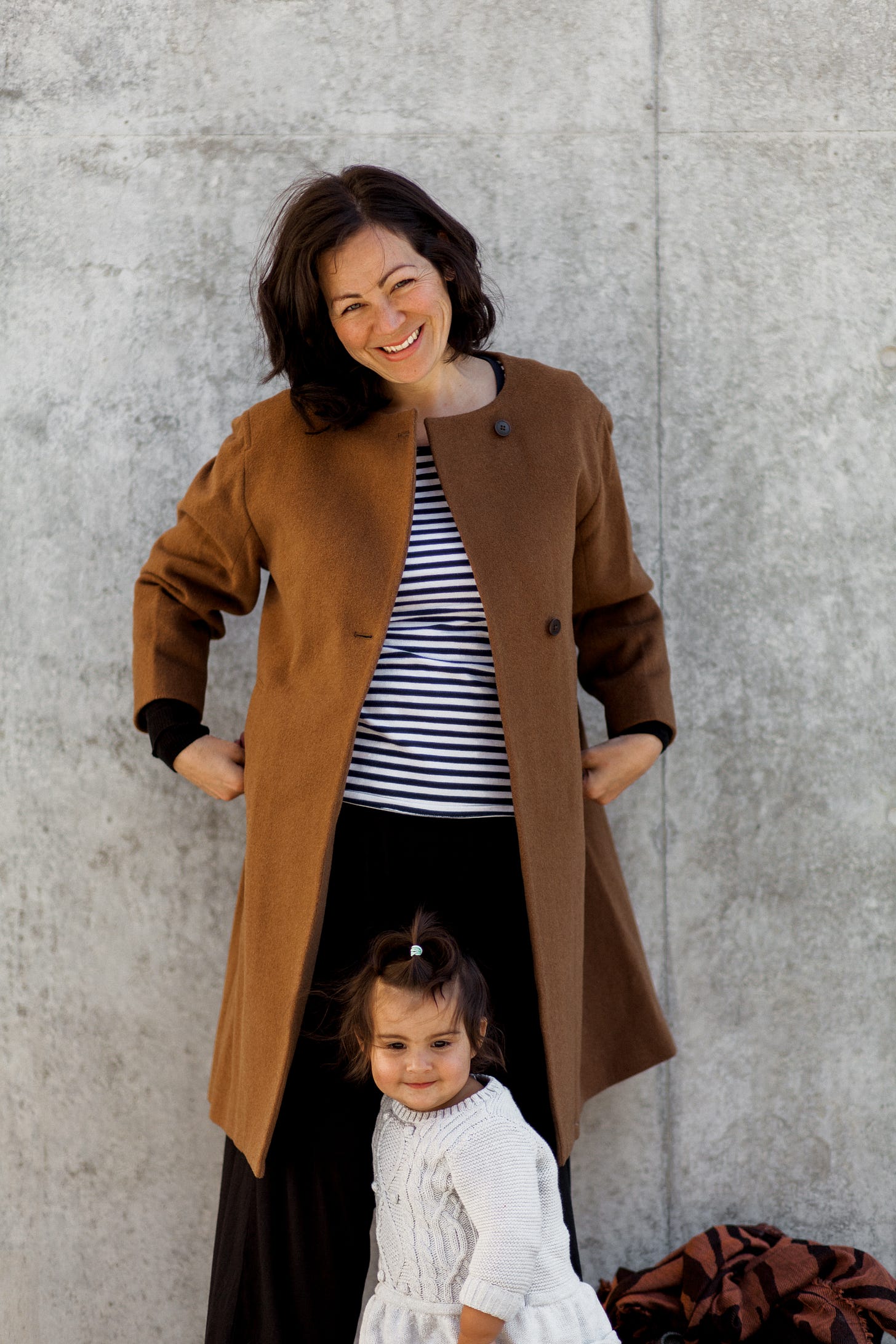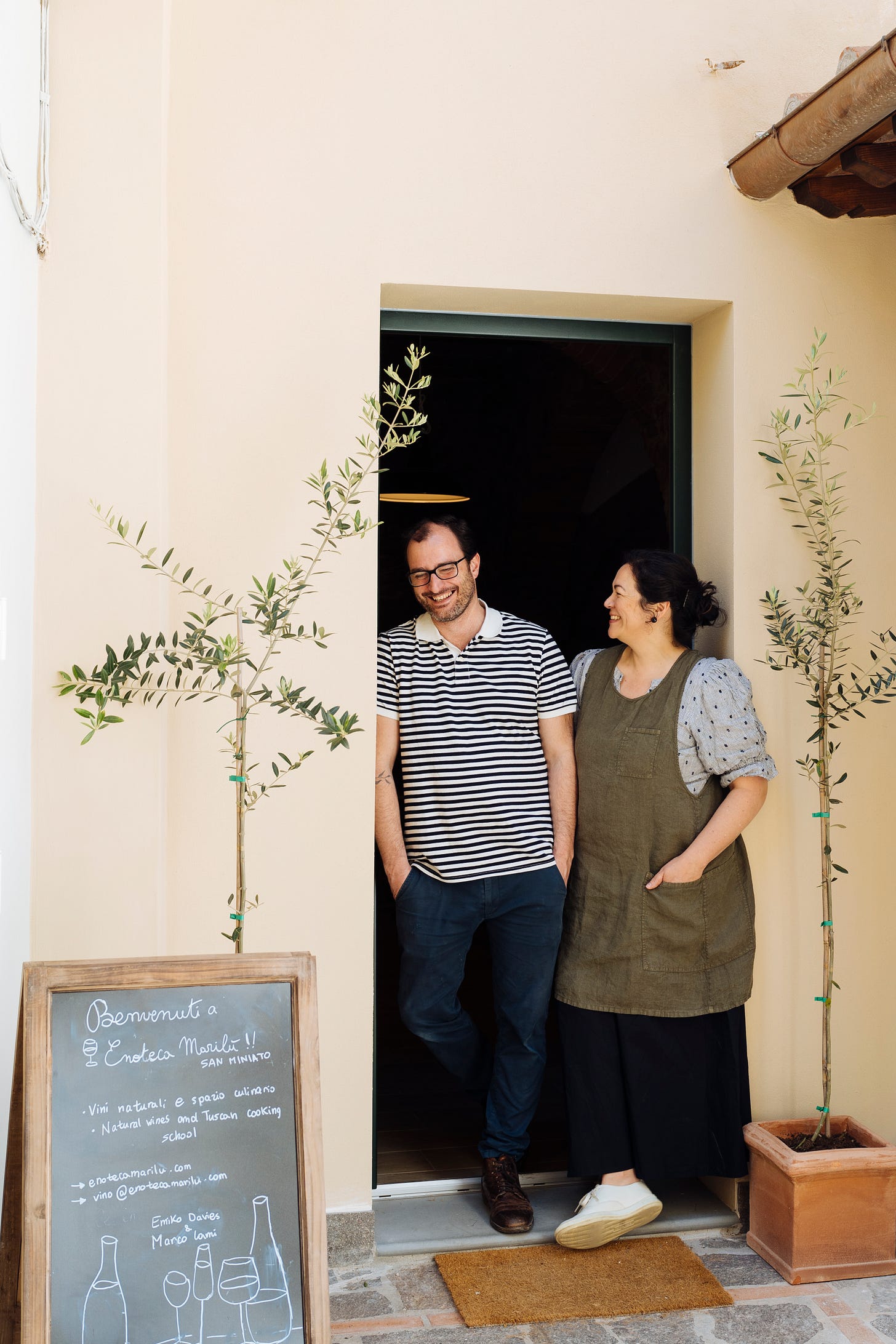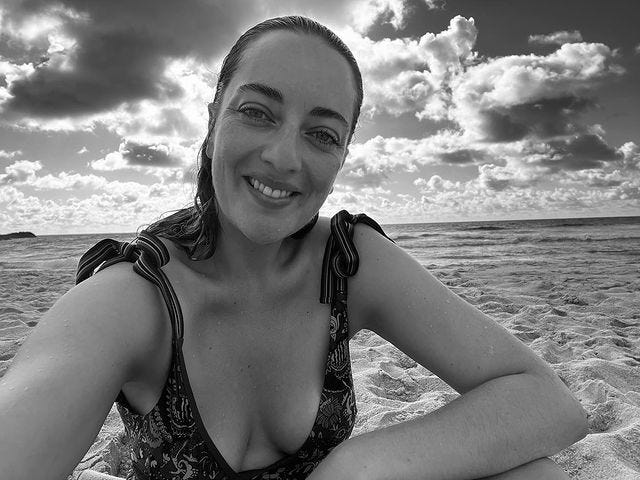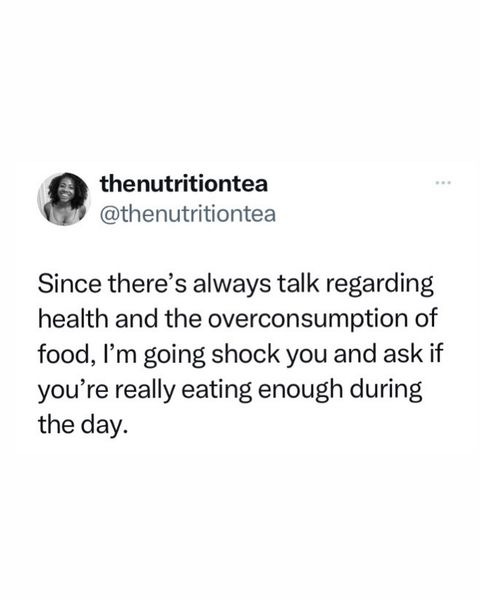"You look so much better!" On nourishment and unwanted comments about your body
And how our appetite can make us feel good
A few years ago when I was on my book tour for Tortellini in Midnight in the spring of 2019 I got one of those unnecessary, unwanted comments that’s perhaps meant to be a compliment but is really not: “You’ve lost so much weight,“ said the acquaintance who I hadn’t seen in years, followed quickly by, “You look so much better!” I think I just managed a terribly fake smile without being able to think of anything clever to say (wish I had had
brilliant advice here) but I’ve thought about that “compliment” for so long.Better.
If only he thought about what he was actually saying to me. If only he knew that at the time I felt the most run down that I had ever felt. I had a 9 month old baby that was literally sucking the life force out of me (here we are above a few months after the comment, a photo taken by my sister Hana), a sweet but anxious 6 year old who was often awake at night with night terrors (which I realised later were not terrors but Alice in Wonderland syndrome — this is one I’ll leave for another day maybe but if anyone wants to talk about it, I’m here!), a husband who worked nights and I had just finished a three month book tour. I was not taking care of myself at all.
If he had asked me what was the “secret” to this “better” body of mine I would have to reply it’s breastfeeding a hungry baby on command, barely sleeping and being alone most of the day and night with two small people, which meant I was cooking with one hand most nights, catering mainly to a highly selective 6 year old with no energy to cook for myself so I just lived off the inevitable leftovers that were refused by the picky one. Here is a bit I wrote around the time (you can read it all, plus a recipe for chicken and ricotta meatballs on my blog):
“I found myself one evening, out of desperation, typing the words “meals you can prepare with one hand” into the search bar and coming up with nothing. There are plenty of helpful suggestions on meals you can eat with one hand (honestly, you can eat nearly everything one-handed, believe me, I’ve attempted), but not so much on what you can cook with one hand. I was of course hoping there was some mind-blowing secret to preparing something simple, tasty, comforting and nutritious to be able to cook and feed myself and my older daughter while holding a cranky, clingy, teething four month old baby on one hip. On a particularly difficult low point, I ended up making a peanut butter sandwich for her (spreading peanut butter with one hand is not as easy as it looks) and the leftover crusts became my dinner.”
I realised it had gotten bad when my daughter pointed out one day, “Mummy you only ever eat leftovers. You’re like a rat!” Kids notice everything. I did not want her to think that I was purposefully avoiding eating food but the fact is I was simply too tired to make myself a nourishing meal for one and was just trying to make it through the end of the evening till bedtime. I also absolutely hate seeing food go to waste. It was just easier to make do with whatever the kids didn’t eat and maybe a cup of tea if I could manage and call it a night.
I was plain exhausted and just couldn’t enjoy food (no time, no focus, no free hands), let alone cook it for myself or even pay any attention to myself — this was the “secret” to my “better” body, Exhausted-Mum-with-2-Kids, and it did not feel good, let alone “better”.
I wasn’t thinking of my appearance; I realise I have no recollection of what I looked like and when I see photos of myself from then I have little to no memory of details from that time. There’s a blank. I was just trying to get up and get through the day taking care of the kids, trying to keep them clean, healthy and fed, or at least two of the three. If you asked me now if I would turn back time to look like that again, going through the same physical exhaustion (and let’s face it, mental and everything-else-exhaustion), I would say a hearty no thank you!
I have thought about that comment on my body for years now and how people assume thinner is healthier, prettier, better, everything-er, and how, if I didn’t already have a fairly strong and confident body image, I could have seriously believed from comments like that that I was better, a better person with a better body, when I was exhausted and alone and stretched thin, physically, mentally and emotionally. It’s never appropriate to comment on someone’s body, positive or negative, even if you think your intentions are good ones.
(Below, here I am today, heavier, older, but more confident, feeling more balanced and more loved than ever, with Marco in front of our new cooking school and enoteca!)
When I think of when I have felt my best, they are times when I generally felt my best mentally, my most balanced emotionally, my happiest — which also means feeling fulfilled, loved, loving, lucky, grateful, content. Glass full moments. These times didn’t actually have anything to do with how I looked physically, no matter what size and shape my body was (and I’ve had a lot of different ones in adulthood).
I also think that your best body or best self can mean whatever you want it to mean. It’s your body, only you know how really it feels to be in it.
Recently my friend and author Charlotte Ree (whose book Heartbake, part memoir, part cookbook, has just come out) shared a similar story about struggling with grief and struggling to keep food down and as a result losing a lot of weight unintentionally. I’m sharing her beautiful words here with her permission:
“I began to feed off of people complimenting me on my weight loss and then, when people started expressing their concerns, and their compliments felt more like comments (‘you’re half the woman you were!’, ‘you’ve got no meat left on your bones!’, ‘how do you possibly eat what you do and look like that!?’), I became deeply self-conscious. I began to feel deeply ashamed of the skin I was in. I went almost three months without being able to eat much more than boiled eggs - I am predictable in my self-soothing in that way. And unfortunately living alone at your lowest allows you to get away with a lot of things you wouldn’t otherwise.
I always used to joke that I never trusted a skinny cook. And I suppose there is some truth to that. I haven’t trusted myself lately. Haven’t trusted that my hopes and dreams won’t betray me again. Haven’t trusted that I am okay being alone. Haven’t trusted that I know which decisions to make, or what course this next part of my life might take. Haven’t trusted that I’m patient enough to sit comfortably in the discomfort of not knowing. The discomfort of being where I am vs where I so desperately want (or perhaps, had once wanted) myself to be.
So, accept or suffer. That’s what I have been repeating to myself. Over and over. Accept that we only have this one precious body of ours - in sickness, and in health. Accept that every single body is different. Accept that some day somebody else is going to love this body of mine, but right now that somebody has to be me. Accepting love for my body for everything I have put it through, for everything it has endured, for everything it has allowed me to do (including my very first ocean swim race today). Unconditional love for the scars and sagging and stretch marks. For doing everything I can to transform all that negative self-talk to more positive self-love. For ultimately being healthier, on the path to being happier.
Oh the joy of finally feeling hungry again.”
Read Charlotte also on how she fell in love with cooking and eating out for one.
“Hunger does not just live in our bellies — in fact, this is often one of the last places we notice it — when our hunger screams with urgency.” — Laura Thomas, nutritionist
Recently, nutritionist
wrote about listening to our bodies and our appetites and I thought it was maybe the best advice for anyone going through the kind of grief, exhaustion or stress that has been described here.“One way we can begin to build more positive connection and trust with our bodies is noticing where and when hunger shows up for you. It’s a gentle way of coming back to our bodies and saying ‘I’m here, I care, and I value your needs’. It can signal to our nervous system, on a primitive level, that we are safe. But it can also just make being in our body a little easier. Don’t get me wrong, bodies are hard a lot of the time. But when we get regular and consistent nourishment we generally feel better. A lot of the time, we are out of touch with our appetite. We learn to push down feelings of hunger. Override and suppress them. We blame our symptoms of low energy, bloating, and being a bit spaced out on not working out enough, or an undiagnosed food intolerance, or too much caffeine. And while it can all 100% be other things, I wonder how we’d all feel IF our bodies could trust that we’d always feed them when they needed to be fed?”
I just want to highlight this bit again: “But when we get regular and consistent nourishment we generally feel better. A lot of the time, we are out of touch with our appetite.” It’s a brilliant read, you can see the full article at Laura’s newsletter
(paid subscribers only) or catch some more of it on instagram (below):I think about how you can tell when your child is about to have a meltdown because it’s too close to dinner time and they’re hungry, or how your partner gets a bit cranky when they need a snack. Maybe we are sometimes better at seeing this in others but not as good at identifying it and letting ourselves be taken care of like the way we take care of others, especially when it’s an ongoing, longer term thing. I’m usually quite good at using food for comfort and healing, but I’ve had those moments where I was so run down I couldn’t even do that.
Some more links
Nutritionist Shana Minei Spence’s (@thenutritiontea) thread pointing out that often we are actually undernourishing ourselves:
“It’s amazing how we constantly question ourselves on whether or not we really need food. The very thing that we actually need in order to function. We try to suppress our hunger with liquids and movement, and when our bodies rebel, then it means we’re “obsessed” with food right?
Here are some tips: Normalize eating food throughout the day. Our body runs on energy that we get from food. Yes we are busy adults with busy lives, so normalize factoring in snacks if you know that meal breaks will be hard. Snacking is not a bad thing and it’s always good to have options available. Normalize eating food and nourishing yourself.”
Anti-diet and eating disorder dietician, Anna Sweeney (@dieticiananna) shared recently this advice about making making body comments:
“There are a lot more important things to talk about. And making reflective body comments isn’t so interesting. What you say in reference to another human’s body, may be elevating extraordinary suffering or illness or a mental health crisis or a million other things. What you say in reference to another humans body, may be minimising improvement in health and quality of life and a million other things.”
I often chuckle about this piece from Irish comedian Dylan Moran from his show Monster where he talks about people pursing the ideal body (“they key word is ideal! You could have anything!"”) and he shares his ideal body (“One eye, you probably only need one. A kind of sucker thing instead of teeth because they just give you grief in the end….” skip to the end for it but the bit on potential is pretty funny too):
If you are wanting to understand more about anti-fatness and how to tackle it, how to be more neutral (and kind) about food and bodies, then take a look at everything that
writes, especially her brand new, NY Times bestselling book Fat Talk and this helpful list of resources below (along with more of her advice on how to respond to body shaming here).Let’s be kind, most of all, to ourselves.
I still have to practice the right response for someone commenting on my body. Recently, someone I hadn’t seen in years made a joke that he didn’t recognise me (pretending he didn’t think it was me in a photo) since we had last seen each other because I had put on weight. I was really caught off guard, I haven’t had a joke made about my body since I was a fat child. I couldn’t even react other than to bite my lip to stop myself from bursting into tears. I can react to other people commenting on someone else’s body -- my youngest daughter Luna has a bigger body and I’ve been her biggest defender, sometimes it’s simply other children asking why is she fat or why does she have a big tummy and I respond gently something along the lines of “We don’t talk about other people’s bodies.” But I’m (still) not the best at being ready to say something when it’s directed at me.
Have you had this happen to you? What did you say? When life gets exhausting or stressful or hard how do you take care of yourself?













That took me all over the place. Usually chubby (more or less) by nature, I have had in the past several episodes of depression with the effect I was not really eating and thus losing weight - and therefore getting a lot of these compliments. Which did not help with depression. At some point in time, a colleague stopped me in my tracks when he - gently - asked if I was putting on a disappearing act: from then on, I sort of associated those body compliments with the idea that people liked me better if I just disappeared. Which is not a healthy place to be, mentally (and eventually, physically).
I went to see a nutritionist just before lock down because I could only eat twice a day - not at all in the evening - and I ended up eating 5 times a day. She said I should feed the body in order to feed the soul correctly. Because deprivation and exhaustion are indeed doing anyone any favour.
Brilliantly written Emiko. Whenever I’ve had comments like that made to me, I’ve been quite sick or on medication that had terrible side effects, and never knew what to say apart from ‘yeah I’ve been sick’. In retrospect I hope that response might have in a small way made the other person question whether they should have asked that question or made that statement. It always felt like I was being congratulated for being unwell, which felt incredibly dismissive of my reality. I think those comments in the end say more about the person who says them than who they say them too, but normalising not commenting on peoples bodies should really be the norm. I hope our society gets there one day.